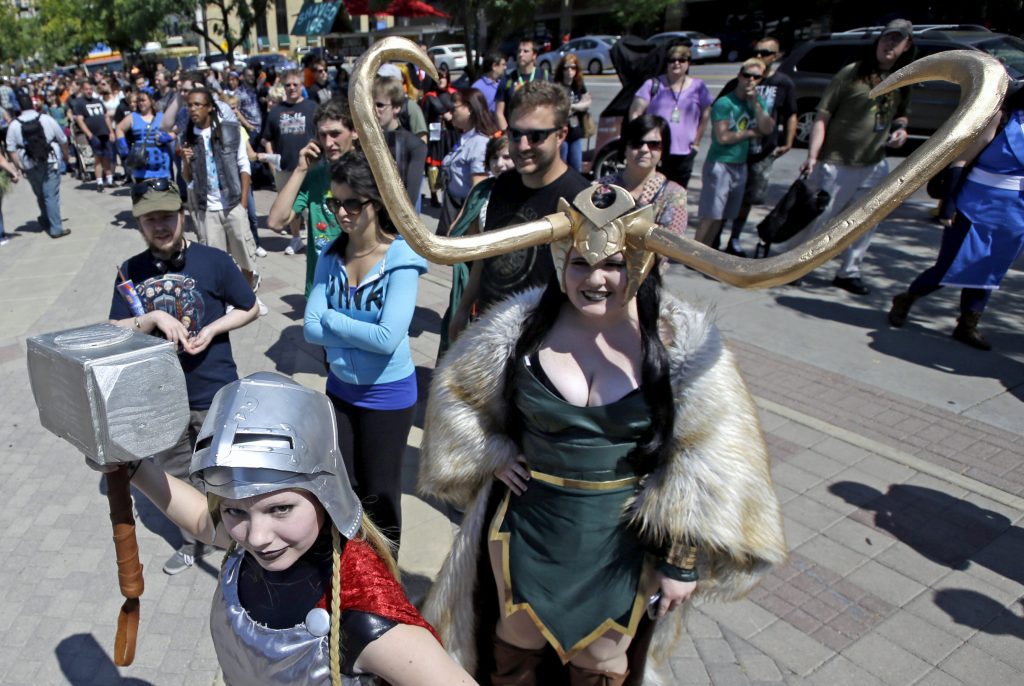
SAN DIEGO (AP) — A jury on Friday sided with San Diego Comic-Con in a court battle with a rival pop-culture convention in Utah over rights to use the phrase “comic con.”
The panel decided that Salt Lake Comic Con used the trademarked phrase without permission, though they didn’t do so willfully. The panel awarded the California event $20,000, far less than the $12 million they’d sought.

“From the beginning all that we asked of the defendants was to stop using our Comic-Con trademarks,” the San Diego Comic Convention said in a statement. “Today we obtained a verdict that will allow us to achieve this.”
Utah co-founder Dan Farr told Salt Lake City TV station KUTV they plan to appeal.
Lawyers for the well-known San Diego convention argued during the trial that the upstart event in Salt Lake stole their name to benefit from their reputation built over years of hard work, Salt Lake City-based newspaper The Deseret News reported .
“This case is about stealing, taking something that is not yours, something you have no right to. It’s about right and it’s about wrong,” Callie Bjurstrom, an attorney for San Diego Comic-Con International, said during closing arguments.
The event that’s considered the flagship of the popular convention circuit filed a trademark violation lawsuit against the rapidly growing Salt Lake convention in 2014. Their request for $12 million in damages included a $9 million advertising campaign to clear up any confusion.
Salt Lake, though, maintains the phrase is a generic shortened form of “comic book convention” and used by 140 events around the country.
Salt Lake organizers saw dozens of unaffiliated events using the term and genuinely thought it was usable when they named their event in 2013, co-founder Bryan Brandenburg testified.
The Utah convention hasn’t hurt the thriving San Diego brand, and less than 1 percent of San Diego Comic-Con attendees have been confused about whether the two events are affiliated, Salt Lake Comic Con attorney Michael Katz argued.
“From the standpoint of people out there, comic con is generic,” he said.
Salt Lake Comic Con has made nearly $3 million since it started in 2013.
Deliberations began Thursday afternoon, the eighth day of the trial. The panel was reduced to six people when one woman was excused because a wildfire was burning near her home.
Since its start in 1970, San Diego has grown into the Holy Grail of pop culture conventions with attendance of more than 135,000, drawing self-described geeks as well as Hollywood studios and actors looking to create buzz for upcoming projects.
Salt Lake Comic Con, meanwhile, has quickly grown to attract more than 120,000 people as well as celebrity appearance from the likes of John Cusack and “Captain America” actor Chris Evans.
Email: [email protected]
Twitter: @STGnews
Copyright 2017 The Associated Press. All rights reserved. This material may not be published, broadcast, rewritten or redistributed.
Hard to imagine that it is cost effective for the San Diego guys to continue to pursue these lawsuits if all they get is a $20,000 award, which cannot cover their attorney’s fees.
It seems that they have created a very profitable business, but with so many other events use subtle variations of their naming, hard to see a practically valid trademark.
SLCC meets a need of Northern Utah residents, but likely has no serious impact on the San Diego events.